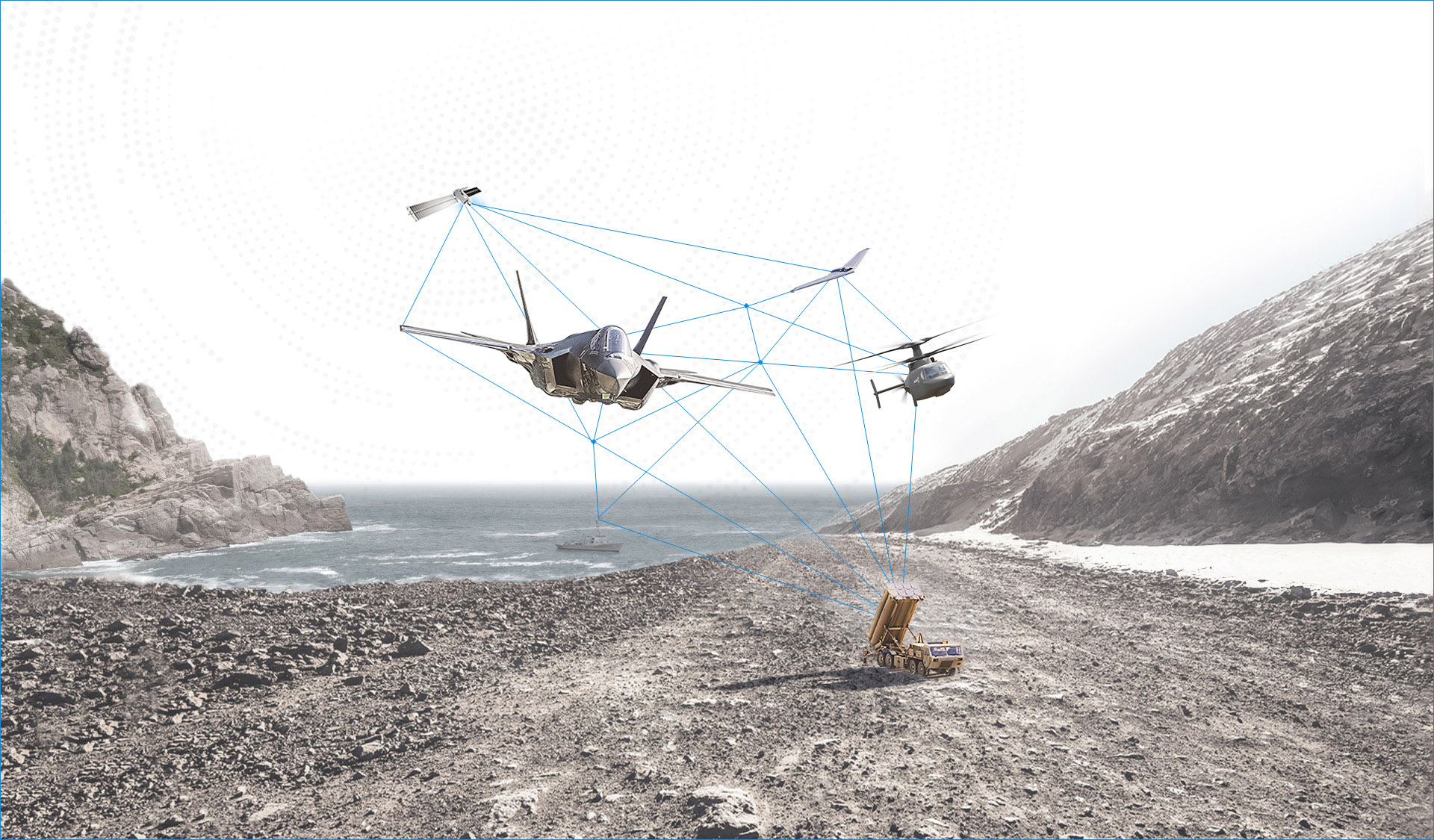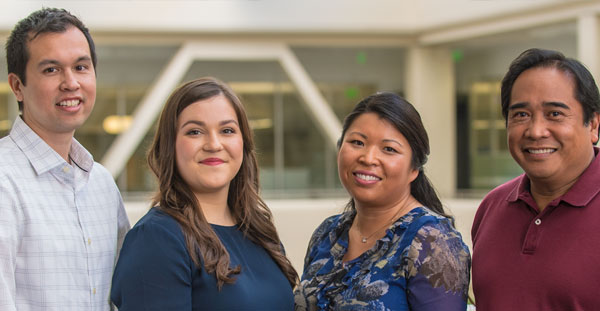With her unique career path from her days as an Air Force combat pilot to now leading Lockheed Martin’s development of the world’s first free-flying commercial space station, Ellie’s non-traditional, winding journey from aviation to aerospace is one which she now cherishes and embraces.
Where It All Began
Like many in the space industry, Ellie’s early interests in STEM and outer space began with formative experiences in her youth. The one that started it all however, was when she was nine years old and won a school-wide contest to see who could come up with the best question to ask an astronaut in space. Ellie’s award winning question was, “Can fish swim in weightlessness?” This enabled her the once in a lifetime opportunity to talk with an orbiting astronaut aboard Space Shuttle Discovery via ham radio, and thus helped to lay the foundation for her lifelong interest in science, outer space and aviation.

Ellie asking her question to an astronaut in space via ham radio.
In her teens, Ellie attended Space Camp followed by the organization’s new “Aviation Challenge” camp where she had her first flight lesson and became hooked on flying. While she loved space, she decided to first pursue her ambition of becoming an Air Force pilot. She then went on to attend the Air Force Academy where she began her aviation career as a cadet glider instructor pilot, leading ground and flight operations at the largest sailplane program in the world.
Ellie’s Early Career

Ellie in a glider at the Air Force Academy.
After completing her pilot training, Ellie was assigned to fly transport aircraft at McChord Air Force Base in Tacoma, Wash., during which time she served as aircraft commander for the C-17A aircraft where she logged over 520 combat hours supporting Operations Iraqi Freedom, New Dawn and Enduring Freedom. During this time, she assisted in the support of numerous high visibility transport missions, including piloting the President’s limousines and Secret Service support detail across the U.S. and flying the Secretary of Defense and the (recently passed) famed Berlin Airlift “Candy Bomber” Pilot Colonel Gail Halvorson through the Middle East. Additionally, Ellie considers her time flying medical evacuation missions out of Iraq and Afghanistan for U.S. soldiers and supporting a 2010 Pakistan humanitarian relief mission which airlifted in 50 tons of emergency cargo and safely evacuated 71 refugees, as the most gratifying and rewarding experiences during her C-17 assignment.

Ellie in front of the C-17.
In 2013, Ellie made a bold career move by transitioning into the burgeoning career field of remotely piloted aircraft (RPA). During her time at Creech Air Force Base she served as an instructor and evaluator pilot for the MQ-1B Predator supporting various combat operations around the globe where she commanded multiple high visibility and high threat intelligence, surveillance, and reconnaissance (ISR) missions in new areas of operation. Ellie also had the opportunity to support maritime patrols, drug raids, combat search and rescue efforts, and most importantly, ensured the safety of ground troops sustaining enemy fire by employing weapons and eliminating numerous enemy targets.
After her 12 year active duty career and being promoted to the rank of Major, Ellie transitioned into the Air Force Reserve where she continues to serve today as a part-time pilot for the MQ-9 Reaper supporting ongoing global surveillance and combat operations.

Ellie in front of an MQ-9 Reaper.
A Leap of Faith
Ellie describes her transition into the civilian sector in 2018 as a “leap of faith.” She says that, “I made the difficult decision to leave all I had known with the military and venture into a new career in the space industry, which many of my military co-workers were amazed by.” When Ellie is asked by colleagues if she has had any regrets on that decision she confidently says, “Absolutely none. I knew I had one life to live and didn’t want to have any regrets for not pursuing my other life-long passion for space.”
Her first opportunity in the space industry began with her involvement in human spaceflight research with NASA when she was selected to participate as a human test subject for NASA’s Human Exploration & Research Analog (HERA) program in Houston, Texas. This intensive 9-week program involved working as a member of a 4-person crew for a simulated 45-day space exploration mission and took place at the Johnson Space Center inside an isolated and confined 148 m3 habitat. “I laugh now when I tell folks about the experience, since most people can now relate to the challenges of isolation after COVID-19… I suppose that opportunity unknowingly gave me a leg up on dealing with a pandemic that was yet to come!”

Ellie(left) and her HERA crew at Johnson Space Center.
After her HERA experience, Ellie went on to work at a private space company called Bigelow Aerospace where she served in several key roles on the company’s B330 spacecraft program, working to develop the next generation of space habitation for human-rated inflatable structures in low earth orbit (LEO) and deep space. Leveraging her experiences from the HERA program, she was able to lead her team in developing a successful prototype for human-in-the-loop testing with NASA astronauts during their NextSTEP Phase 2 contract.

Ellie with the Bigelow Aerospace and NASA Human in the loop testing team outside of the B330 mockup.
Since joining Lockheed Martin, Ellie has had the opportunity to manage the company’s habitation research efforts for NASA, lead the company’s Lunar Mobility Vehicle development project with General Motors, and serve as Program Manager for the Commercial LEO Destinations NASA proposal effort in 2021 which resulted in winning a NASA award to develop a free-flying commercial space station with teammate, Nanoracks.
When asked about lessons learned in the military that have transferred to her civilian work roles, she claims that “teamwork and leadership are essential skillsets that I am grateful to have learned during my time in the Air Force and continue to leverage daily at Lockheed as a program manager.” Ellie says that similar to the amount of people it takes to plan, coordinate, launch, and execute a combat mission… the same can be said about any type of complex engineering project. “It will truly take a cohesive team effort from contributors across many disciplines to successfully design, develop, deliver, and operate our future human spaceflight projects that we are developing here at Lockheed Martin.”
While most people find Ellie’s myriad of interesting experiences fascinating, she admits that at times she felt like a bit of an outsider that didn’t quite fit the mold of either an Air Force pilot or an Aerospace engineer’s traditional career path. “Eventually I learned to embrace the uniqueness of my experiences and realized that it actually provided me with my own distinct set of skillsets, strengths and perspectives that I can bring to a team.” She went on to say, “Diversity is a key component to the success of any organization. I saw firsthand in the Air Force how the diverse backgrounds, experiences, and outlooks of our Airmen who come from all walks of life is what continues to provide us with the unique advantages that make our military so successful. The same can be said for the personnel working on our projects and programs at Lockheed Martin, which was one of the cornerstones of my decision to join this company!”
One of Ellie’s favorite quotes is, “If you want to go fast, go alone; but if you want to go far, go together.” Ellie goes on to say, “If we intend to bring humans back to the Moon and then onward to Mars, it will take everyone to achieve that goal.” Her desire is to continue laying the foundation for the long term vision of getting humans to Mars through Lockheed’s habitation research and development with the Starlab commercial space station. She says, “These efforts will be a critical stepping stone for validating future human-rated structures to be deployed beyond LEO, as orbital and surface habitats, and ultimately to be integrated into spacecraft that will transport astronauts to the red planet.”
For her diverse contributions to military aviation, her research and development efforts supporting the advancement of human space exploration, her extensive youth STEM outreach, and her mentorship activities in support of women in aviation and space, Major Eleanor Morgan was recently awarded the National Aeronautic Association (NAA) 2021 Katharine Wright Trophy. “It’s a tremendous honor to have received this recognition, which would not have been possible without the support of many others throughout the years and the role models that inspired me to pursue my dreams,” she said. “I intend to continue my pursuits of leaving the world in a better place than I entered it and to help inspire the next generation!”

Ellie receiving her Katharine Wright Trophy Award from the NAA in December 2021.
When asked what have been key contributors to her success, Ellie explained, “Blaze your own path and embrace the journey. Remember that every experience (whether it seems to be positive or negative), gives you the chance to learn something unique that may result in greater future success and ultimately lead you to where you want to go!”







